Violent Offenders Must Donate Their Organs To Repay Society
An Anti-Misinformation, Evidence-Based Policy For Crime
Iryna Zarutska’s senseless murder, captured on video, predictably increased the demand for longer sentences behind bars and less tolerance for violent offenders in public spaces. The murderer was obviously crazy and not supposed to be freely roaming the streets. This is a recurring institutional failure, since most crime is committed by repeat offenders. Plenty of smart Substack writers have made strong cases, or at least acknowledged, that removing criminals from society more often or for longer periods reduces crime (1, 2, 3). Among them, there is even a bisexual utilitarian that argues that finding a better man to impregnate your wife is morally recommendable. If such an individual has also reached the “based” conclusion and the tough-on-crime crowd is energized, what is preventing us from unleashing an era of mass incarcerations? The answer is this type of thinking:
My diagnosis: this is a straightforward case of misinformation. “Experts” too ought to classify “soft-on-crime” perspectives as misinformation since this is a high-risk narrative with low evidence. This is a way bigger issue than UFO wackos, Covid vaccine/mask-mandate skeptics, or people convinced of the lab-leak theory. Most young children’s basic instincts on the crime issue are correctly calibrated: the bad guys should be imprisoned or killed. However, they are perverted at some point in their life and converted into dangerous ideas. The danger is that failing to be sufficiently tough on crime can, in the worst case, lead you to end up like pre-Bukele Salvador. This misinformation problem is worsened by the fact that academics and especially journalists tend to be biased in favor of the soft perspective on crime.
I don’t think that individuals who are too empathetic towards criminals and polarized on the left to see the light represent a large percentage of the population. People with right-wing or conservative instincts usually have fewer problems seeing some subgroups as dead weight that need to be cut off. Consequently, they have relatively low empathy for criminals and more readily support tough-on-crime policies, even though they should be more energetic about this issue. People with strong left-wing instincts tend to see violent criminals as lost children who simply needed a better environment to become productive members of society. However, it is clear that left-wing people are not just a bunch of bisounours and have the ability to be hostile to certain groups.1
Ideally, I would like to see them turn some of this hostility towards criminals and start to see gang members as the equivalent of armed Nazis (the real ones, not people posting racist memes on X). I do not have much hope for that, even though I talk about the wonders that mass incarceration, the death penalty, organ extraction, and forced experimentation on prisoners can bring to a society. Anyways, simply correcting crime-related misinformation is already going to take some serious efforts.
Refutations of basic counterpoints on incarceration
I have a left-leaning colleague with whom I frequently chat during coffee breaks. He often returns to the same topics, which is not surprising since he is an old man. One of the recurring topics is crime, that we often argue through different angles with the interventions from other colleagues. In this context, I have often had to dismantle basic “root cause”-type of arguments, one after the other. I think there is value in that, since I have managed to change minds and reduce misinformation about crime at my scale.2 One good article arguing from either a generalist or a new perspective for the tough-on-crime position will often be hand-waved away by a single “root cause”-type comment. Therefore, in this section I refute some of those counterpoints, which I would classify as either very common or reasonable.
Incarceration and longer prison sentences do not reduce crime.
(I will just leave these two graphs here)
Incarceration and longer sentences do not work as deterrents.
It might be the case, but this is not the angle we are approaching this. The point is that incarceration directly prevents criminals from doing the crime. I admit that many people in the tough-on-crime camp believe that long sentences work as deterrents, failing to realize that criminals tend to be too impulsive to take such calculations into account.
We need to have a rehabilitative approach to crime like the Nordic countries in Europe. The rate of recidivism is so much lower in Norway.
Many factors, besides institutional ability to reduce criminality, can significantly influence measured recidivism rates: baseline criminality, deportation policies, and the state’s effectiveness in apprehending offenders. But the most important variable is the difference in definition of recidivism between countries or studies. A very misleading and publicized-by-journalists comparison (1, 2, 3) would find that Norway and the U.S. respectively have a 20% vs 76.6% recidivism rate. Those numbers compare Norway’s two-year reconviction rate with the U.S.’s five-year rearrest rate. I recommend reading this essay to understand the extent of this issue. Moreover, Nordic countries were not fully satisfied after decades of their rehabilitation-first policy and have increased incarceration and started to rent prisons abroad to handle their criminals.
The U.S. already has a high incarceration rate and it has one of the highest murder rates among western countries. Thus, the tough-on-crime approach does not work.
An interesting part of understanding the crime issue is with comparisons across countries.
The soft-on-crime crowd can argue that the U.S. is already among the harshest toward criminals worldwide. However, the U.S. murder rate is also the highest among these countries. When we look at the ratio of murder rates to incarceration rates, we see that:
This graph suggests that, adjusted for the criminality of its population, the U.S. is not exceptional on incarceration relative to other western countries. This comparison does not take into account that the U.S. institutionalizes mentally ill people at a much lower rate (28.4 vs 85 psychiatric beds / 100k, U.S. vs France respectively). Additionally, the U.S. prison population is not populated with people who happened to get caught with some weed: more than 62.4% of the U.S. prison population has committed crimes qualified as violent (murder, rape, robbery, assault). All of these statistics suggest that the U.S. is not particularly tough-on-crime.
Crime tends to be concentrated in specific areas. This is not a big deal since one can simply avoid bad neighborhoods.
I feel like the ones using this line are suffering from a rare case of “based ritual.” It is true that one can accuse innocent or mostly innocent people of lacking agency, skill, or clear-mindedness because they did not leave their bad part of town. But this is a zero-sum situation since some people will always have to live with known crime-prone individuals. That is, of course, unless we “lock them up” or more generally have the legal ability to ban some individuals from accessing or leaving certain areas.Incarceration indirectly increases crime by damaging individuals or breaking up families.
Most observational studies and quasi-random experiments find small or null effects for both the effect of imprisonment3 and the reinforcing peer effect. Some estimates are only a few percentage points criminogenic, a good share are null, and some are even negative.Regarding family breakups, since men commit most crime, this is a corollary of the “fatherlessness causes crime and other bad outcomes” hypothesis. At a first glance, it seems correct since fatherlessness in most obvious forms is correlated with bad life outcomes. However, there is also the selection effects hypothesis. If your father left or was never present, it probably means your parents suck in some way which means you are also likely to turn bad. Life outcomes appear to rank as follows: two-parents = single mother by choice (father is a sperm donor) > separated/divorced > never-married. Those outcomes seem more consistent with a selection effects hypothesis than with the “fatherlessness causes crime and other bad outcomes” hypothesis. I also argue that not seeing your father is often better than being raised near a crime-prone father.
Crime tends to decrease over time. This means we are going in the right direction and the issue will solve itself even without significant changes.
A substantial part of the apparent decrease in crime can be attributed to population aging, better security technology, and teens being glued to their phones. We cannot assume the downward trend of crime to continue decreasing. Additionally, we are not completely sure that crime rates went down as much if we look only at murder rates. Since medicine improved, survival rates of aggravated assault strongly increased which is an effect that directly reduces murder rates. Changes in definitions and shifts in reporting rates (direction unclear) for other crimes make them difficult to compare.
In any case, if we establish that more incarcerations efficiently reduce crime, then we should want them to happen now. Good things such as reduction in violent crime rates happening faster is better than them happening far into the future.Most criminals are mentally ill or suffer from inequality. We cannot hold them responsible for their actions.
I don’t want to go on a long tangent about free will here. I will simply state that people who commit violent crimes without being disturbed or damaged in some way are almost nonexistent. Nobody out there “rationally” decides to sacrifice children to Moloch. For most people, the closest they will come to encountering evil is in the form of a crazy and potentially violent vagrant.Some groups will be targeted disproportionately by mass incarceration.
This is not a problem if it is proportional to the crime rates within those groups.Incarcerations are too costly.
It is true that a prisoner has serious costs to the state. But crime has many negative externalities besides the obvious costs of theft, violence and murder. Among these are increased insurance prices, reduced economic growth, lower willingness to adopt public transport, anxiety and psychological distress, especially for women.
And are people willing to pay more for lower crime rates? Several studies conclude that the answer to the question is yes. We should also ask how much people are willing to pay to ensure criminals have playstations and treadmills? There are easy ways to reduce the cost of incarcerations which we introduce in the next section.
The utilitarian case for the accelerated death penalty, organ extractions, and experiments on prisoners
My short definition of utilitarianism is a moral philosophy in which increasing overall well-being is good and decreasing it is bad. I give it a twist: We care much less, or not at all, about the well-being of violent criminals, for obvious utilitarian motivations and ideas adjacent to this. Simply adding this tiny twist justifies a set of policies to reduce the cost of incarceration under a perfectly reasonable moral framework. Most Western countries spend about 3–7% of their national budgets on public-sector justice (police, courts, prisons), and 0.1–0.3% of GDP on private-sector responses to crime. If we managed to reduce this cost by half, the savings could be used for great things such as providing more money to the poor boomers.
Provide less welfare, prison labor when cost-effective, house more prisoners per room to employ fewer guards, and increase cost-efficiency in general.
This is obvious, right?Facilitate and reinstate the death penalty.
Most Western countries have abolished capital punishment, and those that have not often make it so procedurally complex that that the death penalty costs more than life imprisonment. Globally, we can see that the death penalty tends to exist in unstable countries. And this is the problem; governments tend to carry out executions when they feel their existence is threatened. This makes sense if you see governments as organisms with immune systems. However, this is a sad state of affairs, since I would like to see it used as a simple cost-saving measure in the justice system.For the ones worried about states being too trigger-happy, I would like to remind that humanity is incredibly soft-on-crime on a historical basis. Before leaving the office, Biden used the presidential pardon to save 37 federal death row, all of them were evil in my opinion. Most murderers in China or Saudi Arabia can avoid execution if they express regret or settle with the family of the victim.
Extract organs from violent prisoners.
Another way for criminals to repay their debt to society is to donate their organs. Right now, it is illegal to sell organs almost everywhere but there is a larger-than-billion-dollars profit from illegal organ trade worldwide. This black market is large and could be larger if heart and lungs transplants were easier. This shows that there is a large unmet demand for organs. Extracting organs from prison inmates helps extinguish this black market, strongly reduce the median wait time for organ transplants, and generate revenue for the state. Additionally, it technically allows a murderer to save more lives than he ended prematurely, which is a genuine instance of redemption.
There is also a synergy with the previous proposal: More executions would generate more fresh organs, especially the ones that can only be taken at the cost of the donor’s life, and the possibility of lives saved might push lenient judges to death sentences in serious cases.Allow experimentation on prisoners.
Science is very important and brings huge long-term positive value from a utilitarian perspective, so experiments on prisoners have obvious positive consequences. I am obviously not advocating grim experiments like those carried out by the Nazis. Consider simple and ethical experiments such as clinical trials. It costs millions to start the first phase of a clinical trial. Finding and retaining participants is a real cost for pharmaceutical companies. Prisoners are an accessible pool of experimental units that can be tracked and retained more easily than civilians.Another area where prisoners could help is social science, which is plagued by the replication crisis. One small aspect contributing to this is that social experiments are usually done on willing university students, whose results may not generalize to the broader population. Requiring such social-science experiments to include prisoners, who in many ways are the opposite of willing university students, across treatment groups could serve as a helpful control procedure. I also think allowing experimentation on prisoners is a policy where cheap supply can increase demand and open up new ideas of experiments, which is good for science!
Mr. Beast-style shows.
For those unaware, Mr. Beast is the most popular YouTuber in the world. His shtick is to organize “Would you get locked in a room for 100 days in exchange for a million”-type of challenges and then post the video online. I do not fully understand the large audience for this type of content. But the important part is that it makes a lot of money and that a good chunk of it is used for charities. This is where Bentham's Bulldog, the ringleader of Effective Altruists, intervenes and gives his utilitarian seal of approval to Mr. Beast. We have the green light to organize some entertaining shows involving prisoners!
More concretely, I think we can bounce off an idea of DeepLeftAnalysis🔸. Since he is a genuine soft-hearted neoliberal, he wants a better solution than incarceration to the crime problem. His solution is simply to send them to Haiti! Some people might think that his obsession with sending violent criminals to Haiti stems from morbid curiosity, hoping to see battle-royale-style contests among gangs. But this accusation is simply a reflection of their own sadism, a weakness that we can abuse to extract money from them to provide mosquito nets in poor countries. I am sure a figure like Mr. Beast4 can produce a reality TV show with huge viewership.
Some people might object to those kinds of shows on moral grounds. It is simply too indecent, right? That would be a valid point if high-profile serial killers did not receive films glamorizing and feeding their brand. In many cases, they have many admirers and marry women a few decades younger while in prison. They can even earn money depending on their marketing skills and the laws of the country where they are incarcerated.
I admit that the last policy proposal may have been added to give this article a slightly edgy tone.5
But I must say that I am genuinely baffled that some people still think that young depressed women with sociology degrees or previously incarcerated youth leaders are going to solve anything. In an age where decades of relatively good crime statistics have been recorded and information can flow freely through internet, we are still stuck with large segments of the population spreading misinformation about crime. Academics do not seem alarmed about that. Even self-described conservatives, who usually belong to the tough-on-crime team, are often unable to recognize misleading statistics when they are presented as arguments. The discussion is left to vibes, temperament and aesthetic preferences.
We can think of recent events, such as reactions to the Charlie Kirk’s murder.
I still have to convince them that the death penalty is great, too.
I suspect this review is slightly biased due to the content of the abstract and because it was published in 2021 (Floyd era).
Actually, he is an obsessive hustler that provided unique entertainment to the world and deserves some respect for that.
Though, I stand by my experimentation and organ extraction ideas.


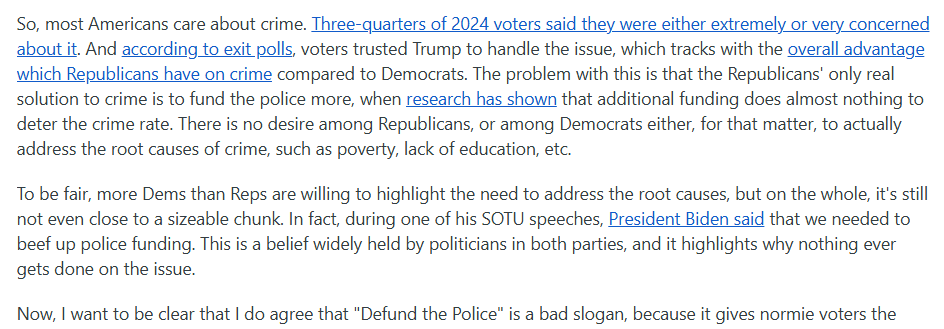
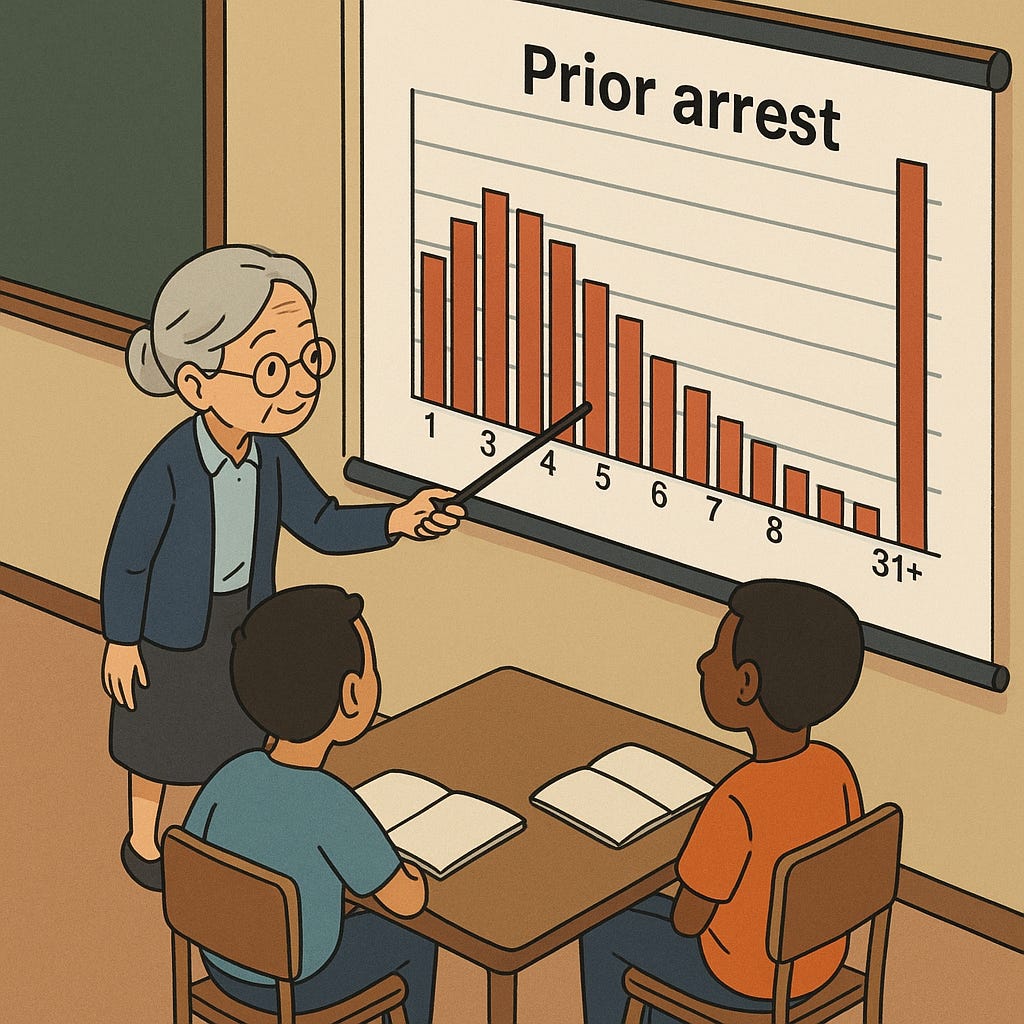
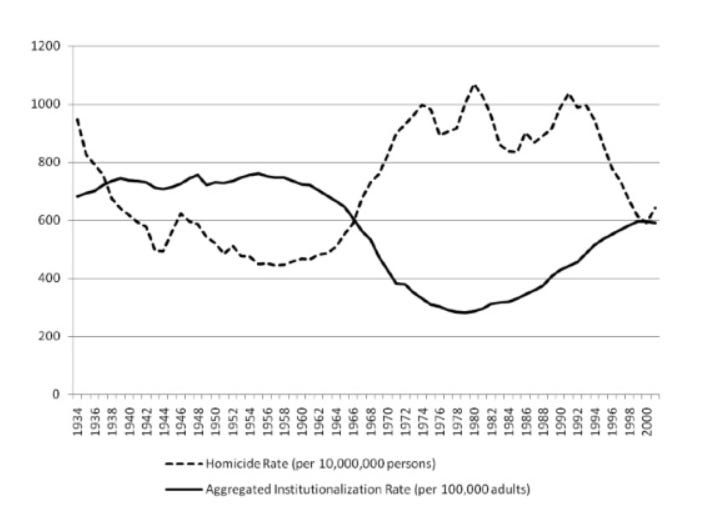
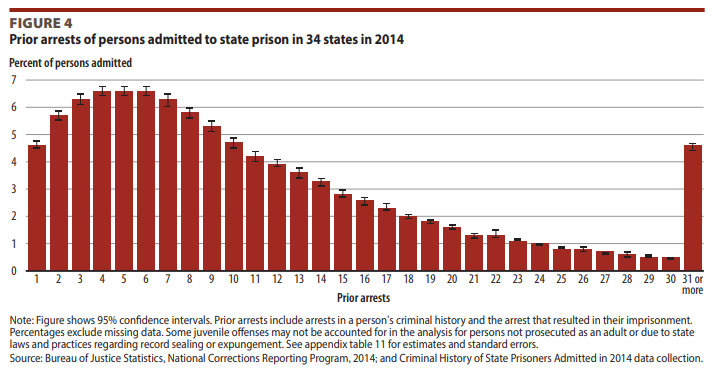
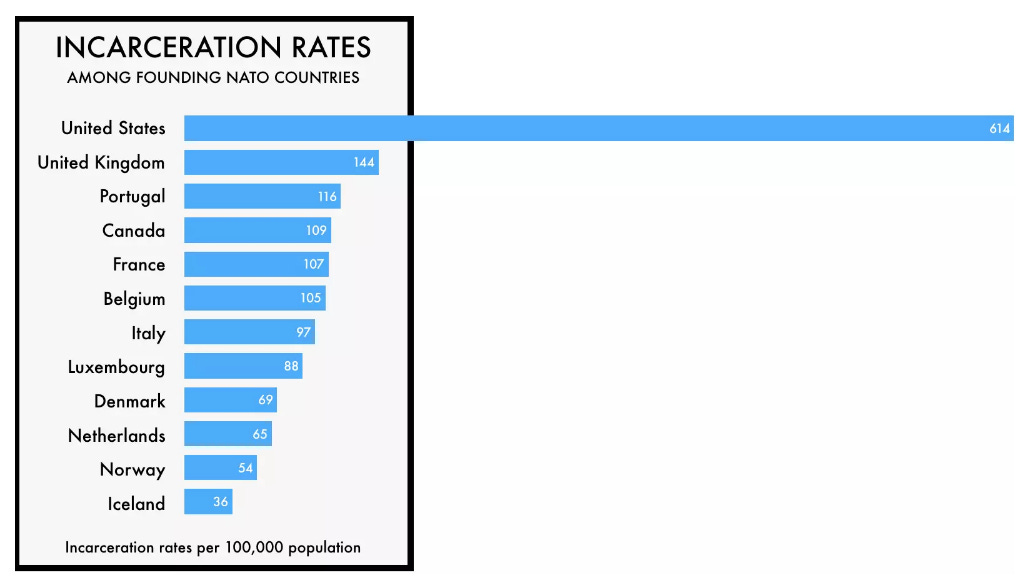
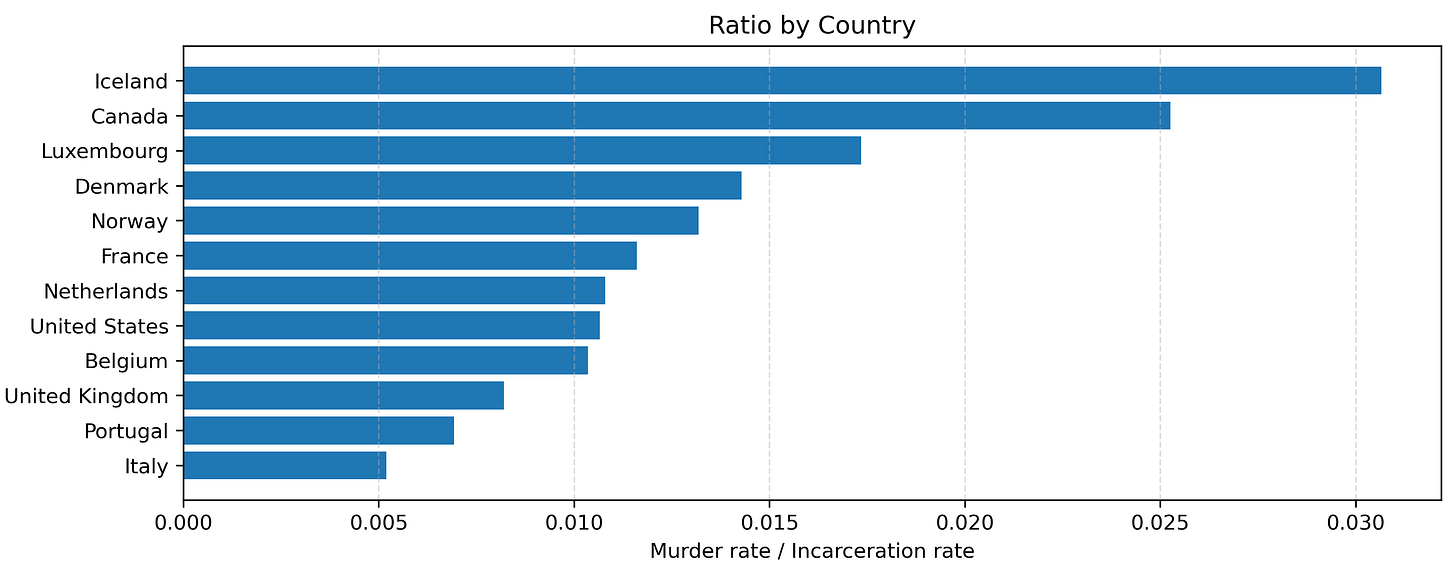

I can report from inside the DC conservative movement that a lot of conservatives here actually aren't on the tough-on-crime team. That's why nothing gets done on this issue.
At the end of the day if you wanna get serious about solving the problem of vagrancy in American cities, along with a host of other issues, then re-instituationalizing the mentally ill in insane asylums is going to be necessary. You should do a piece on that.